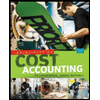
a.
Calculate the net realizable value of Beta-1 for the year ended November 30.
a.
Answer to Problem 68P
The net realizable value for Beta-1 is $375,000.
Explanation of Solution
Net realizable value method:
Net realizable value method is used to allocate the cost in the proposition of their net realizable market value at the split-off point. If the product can be sold at the split-off point then the selling price of that product at a split-off point is used as the base for the calculation of cost allocation.
Calculate the net realizable value for Beta-1:
Thus, the net realizable value for Beta-1 is $375,000.
Working note 1:
Calculate the unit produced for Beta-1:
Working note 2:
Calculate the price per unit for Beta-1:
There is no further processing for the Beta-1, so the sales value at the split-point should be used.
b.
Calculate the joint costs for the year ended November 30 to be allocated.
b.
Answer to Problem 68P
The joint cost for the year ended November 30 is $1,050,000.
Explanation of Solution
Cost allocation:
Cost allocation is the process of distributing the common cost of the production and service rendered to the various departments of the business. It is used to calculate the actual cost attributed to a specific department.
Calculate the joint cost for the year ended November 30:
| Particulars | Amount |
| Cost of alpha-11 | $720,000 |
| Direct labor | $180,000 |
| Manufacturing overhead | $150,000 |
| Total joint costs | $1,050,000 |
Table: (1)
The joint cost will consider all the costs to the split-off point.
Thus, the joint cost for the year ended November 30 is $1,050,000.
c.
Calculate the cost of Beta-2 sold for the year ended November 30.
c.
Answer to Problem 68P
The total cost of the Beta-2 is $705,000.
Explanation of Solution
Cost allocation:
Cost allocation is the process of distributing the common cost of the production and service rendered to the various departments of the business. It is used to calculate the actual cost attributed to a specific department.
Calculate the cost allocation of Beta-2:
| Particulars | Amount |
| Allocation to Beta-2(3) | $210,000 |
| Direct labor | $337,500 |
| Manufacturing overhead | $157,500 |
| Total cost of Beta-2 | $705,000 |
Table: (2)
Thus, the total cost of the Beta-2 is $705,000.
Working note 3:
Calculate the joint cost allocation to Beta-2:
Working note 4:
Calculate the total net realized value of the company:
| Particulars | Amount |
| Net realizable value of Beta-1 | $375,000 |
| Net realizable value of Beta-2 | $225,000(5) |
| Net realizable value of Beta-3 | $525,000(6) |
| Total net realized value | $1,125,000 |
Table: (3)
Working note 5:
Calculate the net realizable value of Beta-2:
| Particulars | Amount |
| Sales value | $720,000 |
| Less: direct labor | $337,500 |
| Less: manufacturing overhead | $157,500 |
| Net realized value | $225,000 |
Table: (4)
Working note 6:
Calculate the net realized value of Beta-3:
| Particulars | Amount |
| Sales value | $1,417,500(7) |
| Less: direct labor | $487,500 |
| Less: manufacturing overhead | $405,000 |
| Net realized value | $525,000 |
Table: (5)
Working note 7:
Calculate the sales value of Beta-3:
d.
Calculate the value of the ending inventory for Beta-1.
d.
Answer to Problem 68P
The value of ending inventory is $140,000 for Beta-1.
Explanation of Solution
Ending inventory:
Ending inventory unit is the units lying in the store due to its-non issuance in the current period. Ending inventory for the current period is the beginning inventory for the next period.
Calculate the ending inventory for Beta-1:
Thus, the value of ending inventory is $140,000.
Working note 8:
Calculate the units of ending inventory (unit):
Working note 9:
Calculate the units of ending inventory ($):
Want to see more full solutions like this?
Chapter 11 Solutions
FUNDAMENTALS OF COST ACCOUNTING
- I need assistance with this general accounting question using appropriate principles.arrow_forwardCan you explain this financial accounting question using accurate calculation methods?arrow_forwardIn the first two years of operations, Expos company reports taxable income of $125,000 and $65,000, respectively. In the first two years, the company paid $50,000 and $13,000. It is now the end of the third year, and the company has a loss of $160,000 for tax purposes. The company carries losses to the earliest year possible. The tax rate is currently 25%. Required Compute the amount of income tax payable or receivable in the current (third) year.arrow_forward
- Please explain the solution to this general accounting problem with accurate principles.arrow_forwardCan you solve this financial accounting problem with appropriate steps and explanations?arrow_forwardPlease provide the answer to this financial accounting question using the right approach.arrow_forward
 Managerial Accounting: The Cornerstone of Busines...AccountingISBN:9781337115773Author:Maryanne M. Mowen, Don R. Hansen, Dan L. HeitgerPublisher:Cengage Learning
Managerial Accounting: The Cornerstone of Busines...AccountingISBN:9781337115773Author:Maryanne M. Mowen, Don R. Hansen, Dan L. HeitgerPublisher:Cengage Learning Cornerstones of Cost Management (Cornerstones Ser...AccountingISBN:9781305970663Author:Don R. Hansen, Maryanne M. MowenPublisher:Cengage Learning
Cornerstones of Cost Management (Cornerstones Ser...AccountingISBN:9781305970663Author:Don R. Hansen, Maryanne M. MowenPublisher:Cengage Learning Principles of Cost AccountingAccountingISBN:9781305087408Author:Edward J. Vanderbeck, Maria R. MitchellPublisher:Cengage Learning
Principles of Cost AccountingAccountingISBN:9781305087408Author:Edward J. Vanderbeck, Maria R. MitchellPublisher:Cengage Learning


